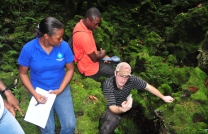WKU News
WKU group conducts water resources training in Jamaica
- Wednesday, September 17th, 2014
Increasing knowledge with regard to water resources is becoming a focal point in developing regions, particularly in the Caribbean and for coastal areas. Nearly half the world’s population lives within 150 kilometers of a coastline, including all of Jamaica’s almost 3 million residents. Threats from sea level rise and population growth, among others, strain fresh water resources in places like Jamaica, and need to be addressed in order to find a sustainable path forward.
Over the past several months, Dr. Jason Polk of the Department of Geography and Geology and WKU Center for Water Resource Studies led two training workshops in Jamaica in partnership with the Jamaican Water Resource Authority (JWRA) and the International Atomic Energy Agency (IAEA). These workshops focused on capacity building and groundwater science with regard to water resource tracing to aid the JWRA in developing methods and sound scientific practices for conducting water investigations. WKU staff and graduate students also participated in hosting these workshops, gaining a true international experience in water resources research and outreach.
The first workshop, held in October 2013, was focused on isotope hydrology. This is a branch of science that uses geochemical tracers, like the elements of oxygen and hydrogen, to track water from its source of evaporation, to when it falls as precipitation, until it eventually becomes groundwater. Isotopes are powerful tools for conducting water investigations; yet, only recently, due to advances in technology and the rising need for new analytical techniques for water research, have they been more heavily utilized as water tracers. The workshop was co-taught by Dr. Jonathan Sumrall from Sam Houston State University. Dr. Sumrall is an expert on the stable isotopes of sulfur and groundwater geochemistry, particularly their use in karst environments, such as Jamaica, where caves and sinkholes are the primary means by which water enters the aquifer and flows underground.
A team from WKU returned at the end of January 2014 to conduct a second workshop that integrated methods of isotope hydrology, dye tracing and water quality research. Participants included WKU Crawford Hydrology Lab Manager Lee Anne Bledsoe and WKU Geosciences graduate student Dan Nedvidek.
Bledsoe manages the Crawford Lab, which has specialized in dye tracing of groundwater for many decades. She has many years of experience in dye tracing, wherein non-toxic fluorescent dyes are used to trace water pathways in areas, such as underground streams and dams. These water features are often inaccessible and difficult to study using traditional methods. She is also a Geosciences graduate student and received a student grant from the Karst Waters Institute to conduct this research as part of her graduate research program.
Nedvidek is a graduate student who just completed his thesis research on stormwater quality monitoring and regulation in areas like Bowling Green, also a karst groundwater region, under Dr. Polk’s supervision. This research is novel in that it can be applied in a variety of settings, such as Jamaica, to study groundwater pollution as well as the effects of things like climate change, which could impact rainfall amount and water quality. Nedvidek provided training on how water quality monitoring can complement isotope and dye tracing techniques to study a karst watershed holistically.
The team was able to train and assist the JWRA in successfully initiating a dye trace in the Cave Valley watershed. This is a karst region of Jamaica where most of the streams flow underground through caves and are part of the large regional aquifer system. These water resources are important for cities like Kingston, home to more than 700,000 people who depend upon the groundwater supply for their drinking water. Recently, work began to develop water tracing projects in the region and work toward better delineating these basins and possible sources of recharge and pollution.
“This type of collaborative training and capacity building is the most effective means by which to empower governments, citizens, and even whole countries with the necessary tools to study and utilize their water resources in a scientific and sustainable manner,” Dr. Polk said. “Our work with JWRA is cutting edge with regard to the methods and tracer techniques using isotope hydrology combined with dye tracing to examine watersheds, and really is a testament to the region’s dedication to managing its water supply and the support of agencies like IAEA in making this possible.”
An interesting note during the team’s visit was the reaction of many Jamaicans to a recently released study on global climate temperature predictions. The study, published in the highly renowned scientific journal Nature, provided predictions of the hottest places on the planet in the coming decades in the face of climate change. Kingston, Jamaica, was slated to be one of the hottest places on Earth by 2020, which will have an impact on storms and drought in the country, further threatening its already vulnerable water supply.
“Water is the most valuable and threatened resource on the planet,” noted Geography and Geology Department Head Dr. David Keeling, “and this initiative is just one of many underway in the geosciences at WKU that aims to focus greater attention on the critical challenge of water supply, access, and quality.”
For more about this project, contact Dr. Jason Polk at jason.polk@wku.edu or 270-745-5015, or @ProfJasonPolk on Twitter.
Some of the links on this page may require additional software to view.





